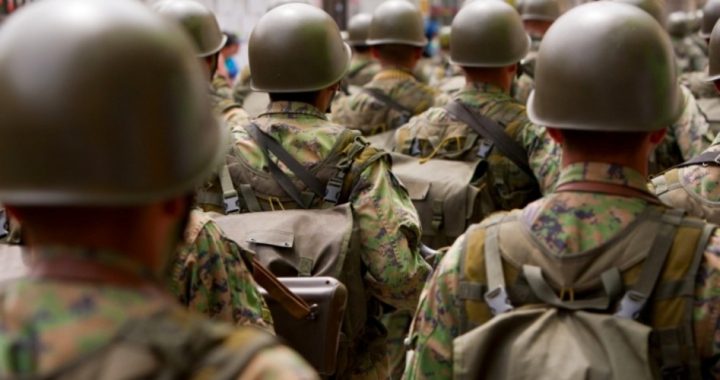
A little over a year after the “Don’t Ask, Don’t Tell” (DADT) ban on homosexuals in the military was officially dropped, the Department of Defense has admitted that it has a problem with sexual assault by male soldiers on other men. The Washington Times noted that, according to an anonymous survey conducted by the Defense Department among military personnel, more men than women are sexually abused in the military each year, with assaults overwhelmingly perpetrated by other men.
Results of the survey show that of the estimated 26,000 service members who were victims of sexual assault in 2012, roughly 14,000 of the victims were men, while some 12,000 were women, according to a scientific survey sample released by the Pentagon.
A 129 percent increase in sexual assaults among military personnel since 2004 has prompted Defense Secretary Chuck Hagel to launch a campaign to deal with “unwanted sexual contact,” among the troops. But the project has become more complicated by the fact that an inordinate number of the assaults are apparently being perpetrated by male homosexuals — close on the heels of their high-profile welcome into the ranks.
Elaine Donnelly, president of the Center for Military Readiness, noted that the number of formal reports of sexual assault in the military annually skyrocketed from 1,275 to 2,949 in just eight years, and the numbers of same-sex assaults appear to be one of the factors. Donnelly said that women are identified as the assailants in just two percent of all assaults, which means that almost all of the 14,000 or so men who have been assaulted sexually were targeted by other men. “It appears that the DoD has serious problems with male-on-male sexual assaults that men are not reporting and the Pentagon doesn’t want to talk about,” Donnelly charged.
Donnelly, whose group took a lead role in the fight to keep DADT in place, charged that the DoD’s Sexual Assault Response and Prevention Office “continues to focus its attention on women who experience abuse but don’t report it, overlooking the far greater numbers of men who, according to the survey, are experiencing abuse but not reporting it. If the Pentagon considers the survey results a credible reflection of hidden reality, they must also concede that there are more men than women who are being sexually assaulted.”
Aaron Belkin of the Palm Center, which promotes homosexuality in the military, insisted to the Washington Times that “very few” of the perpetrators of male-on-male sexual assault are homosexual, claiming that the attacks are “somewhat similar to prison rape.” Donnelly called such a notion “outrageous,” telling World Net Daily that the increasing numbers of same-sex assaults has the military officials flummoxed. “The Department of Defense doesn’t quite know what to do with these figures,” she said, “and so they just sort of put them in there and hope nobody notices.”
Donnelly said it is crucial to monitor the numbers of sexual assaults to document how two significant changes in the military — welcoming homosexuals and allowing an increasing role of women in combat arenas — are negatively impacting military readiness. She said DoD officials appear to be in denial over the connection between these two issues and the increase in sexual assaults among military personnel.
As for addressing the increasing problem of sexual assaults against females, she told World Net Daily that “I think we have to start with the basics, and that means basic training. Back in 1998, unanimously, the Kassebaum-Baker Commission came out with recommendations to separate basic training for Army, Air Force, and Navy trainers, [to] do it like the Marines do. The Marines train basic training separately, male and female at Parris Island. That’s a good thing to do. It’s a good first start.”
More fundamentally, she added, the DoD must “stop pretending that sexuality does not matter. You cannot solve a problem by extending it into the combat arms. The big push is for women in combat — this argument that we have to have women in the infantry so they’ll be respected more and they won’t be assaulted.”
Donnelly pointed out that while respect for women in the military is at an all-time high, so are the sexual assaults against them. She said that the Pentagon and policymakers in Congress “need to assess where we are, what has happened in the last two decades, and they need to stop pretending that a lot of sensitivity training or highly paid consultants [are] going to make a difference in the sex problems we’re seeing right now.”
In a statement released by the Center for Military Readiness, Donnelly said that both male and female military personnel deserve “reality-based policies that combine recent lessons learned with classic principles that should be strengthened, not weakened. Congress must intervene before the administration’s incremental plans irreversibly extend unresolved social problems into fighting battalions that are key to mission accomplishment in the all-volunteer force.”



